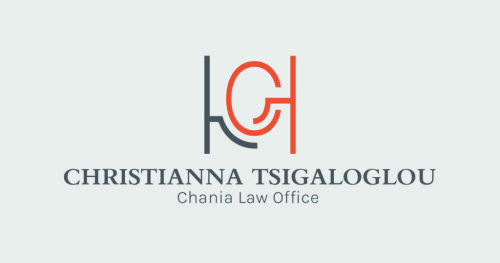Best Citizenship Lawyers in Chania
Share your needs with us, get contacted by law firms.
Free. Takes 2 min.
List of the best lawyers in Chania, Greece
About Citizenship Law in Chania, Greece
Citizenship law in Chania, Greece, follows the national regulations set by the Greek government while considering the specific administrative processes of the local area. Acquiring Greek citizenship grants individuals the rights and responsibilities afforded to Greek nationals, such as the right to reside, work, and participate in public life in Greece and the European Union. Common pathways to citizenship include birth, descent, naturalization, and marriage to a Greek national. The process involves meeting legal requirements and engaging with various local and national authorities.
Why You May Need a Lawyer
Seeking legal assistance for citizenship matters in Chania can be beneficial for several reasons. Greek citizenship law is complex and frequently updated, with strict documentation and procedural requirements. Applicants may need a lawyer when facing difficulties such as documentation issues, unclear eligibility, delays or denials in the naturalization process, appealing negative decisions, or dealing with unique circumstances, such as statelessness or complex family situations. Additionally, legal guidance ensures compliance with both local and national regulations, helping avoid costly mistakes or delays.
Local Laws Overview
While Greek citizenship is governed by national legislation, local authorities in Chania play a key role in handling applications and verifying documentation. Key aspects include:
- Proof of legal residence within Chania or another part of Greece
- Documentation such as birth certificates, marriage certificates, and evidence of Greek heritage, if applicable
- Requirements for knowledge of the Greek language and integration into Greek society, which may include interviews or examinations
- Processing times and procedures that may vary between Chania and other regions
- Appeal processes for cases of denied citizenship
Understanding both national requirements and how local authorities in Chania implement them is crucial to a successful application.
Frequently Asked Questions
What are the main ways to acquire Greek citizenship in Chania?
Citizenship can be acquired by birth, descent (if you have Greek parents), marriage to a Greek citizen, or through naturalization after a period of legal residence in Greece.
How long does it take to obtain citizenship through naturalization in Chania?
The process can take several months to a few years, depending on the complexity of your case, the completeness of your documents, and the current workload of local authorities.
Do I need to speak Greek to become a citizen?
Yes, most applicants are required to demonstrate proficiency in the Greek language and familiarity with Greek culture and history as part of the naturalization process.
Is dual citizenship allowed in Greece?
Yes, Greece allows dual citizenship. You do not have to renounce your previous citizenship when applying for Greek citizenship.
Can children born in Chania automatically acquire Greek citizenship?
Children born in Greece to at least one Greek parent typically acquire citizenship automatically. For children of foreign parents, additional requirements may apply.
What documents are needed for a citizenship application?
Documents can include birth certificates, passports, residence permits, proof of Greek language knowledge, tax documents, and, for descendants, evidence of Greek ancestry.
What happens if my citizenship application is denied?
You have the right to appeal the decision. It is recommended to consult with a lawyer to understand the reasons for denial and the best approach for appealing.
Can I apply for citizenship if I am married to a Greek citizen?
Yes, marriage to a Greek citizen can provide eligibility for citizenship, typically after several years of marriage and residence in Greece.
What is the role of the local municipality in Chania during the citizenship process?
Local municipal authorities are responsible for collecting documentation, conducting initial interviews, and forwarding your application to relevant national bodies.
Do stateless individuals have a pathway to Greek citizenship in Chania?
Stateless persons may apply for citizenship under special provisions, but the process can be complex and requires thorough legal guidance.
Additional Resources
There are several local and national resources you may find helpful for citizenship matters in Chania, Greece:
- Chania Municipality Office - For submitting documents and initial inquiries
- Greek Ministry of Interior - Citizenship and Migration Department
- Kep - Citizen Service Centers in Chania for document certification and general guidance
- Hellenic Ombudsman - For complaints and appeals concerning administrative procedures
- Local bar associations for specialized legal representation in citizenship cases
Next Steps
If you plan to begin or are already involved in the citizenship application process in Chania, consider taking the following steps:
- Collect all necessary documents according to your application type
- Visit the local municipality or Citizen Service Center for initial advice and to start your application file
- Consider consulting a lawyer who specializes in Greek citizenship cases, especially if you encounter complications or believe your file may be complex
- Keep track of deadlines and maintain open communication with authorities throughout the process
- If your application is denied, seek immediate legal advice to understand your appeal options
Professional legal guidance can streamline the process, prevent common mistakes, and improve the likelihood of a successful outcome for your citizenship application in Chania, Greece.
Lawzana helps you find the best lawyers and law firms in Chania through a curated and pre-screened list of qualified legal professionals. Our platform offers rankings and detailed profiles of attorneys and law firms, allowing you to compare based on practice areas, including Citizenship, experience, and client feedback.
Each profile includes a description of the firm's areas of practice, client reviews, team members and partners, year of establishment, spoken languages, office locations, contact information, social media presence, and any published articles or resources. Most firms on our platform speak English and are experienced in both local and international legal matters.
Get a quote from top-rated law firms in Chania, Greece — quickly, securely, and without unnecessary hassle.
Disclaimer:
The information provided on this page is for general informational purposes only and does not constitute legal advice. While we strive to ensure the accuracy and relevance of the content, legal information may change over time, and interpretations of the law can vary. You should always consult with a qualified legal professional for advice specific to your situation.
We disclaim all liability for actions taken or not taken based on the content of this page. If you believe any information is incorrect or outdated, please contact us, and we will review and update it where appropriate.









